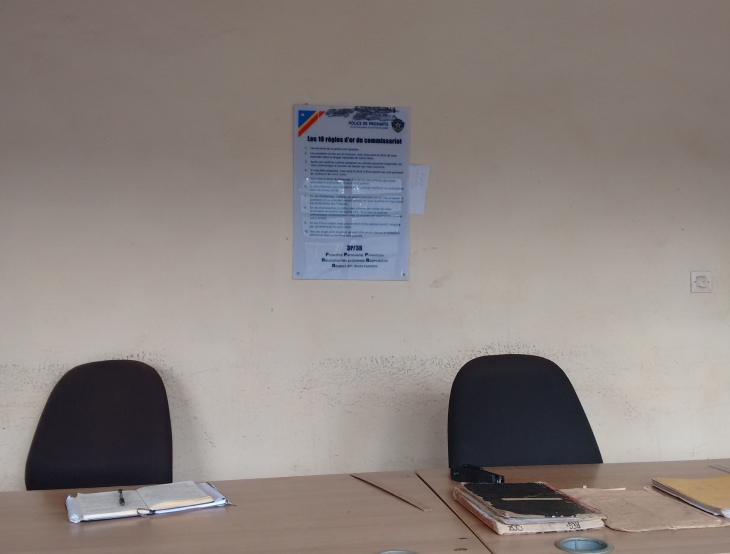« Polisi Siku Kwa Siku » Introducing the project and its blog series
by Michel Thill, Josaphat Musamba and Robert Njangala.
This blog has been published in French by Rift Valley Institute.
According to the first World Internal Security Police Index (WISPI) of 2016 published this year, an index classifying police institutions across the world according to four criteria—capacity, process, legitimacy and outcomes—the Police Nationale Congolaise (PNC, Congolese National Police) of the Democratic Republic of the Congo (DRC) came second to last in a list of 127 countries. Observers may say this is hardly surprising. Indeed, in the current political climate, the PNC has repeatedly proven its capacity to violently repress often peaceful demonstrators, who have been demanding a transfer of power following the constitutional end of President Kabila’s second mandate on 19 December 2016.
At first glance, the anti-riot units suggest that policing in the DRC is more about repression than about the protection of citizens and their property. These units, however, make up only a small part of the PNC. Indeed, the majority of Congolese police officers are part of the police territoriale (territorial police; officers deployed across police stations), the heart of the PNC, and other special units such as the traffic police, the border police, the mining police and others. Their everyday work is alongside the population, and happens largely without the use of excessive violence.
The aim of the pilot project « Polisi Siku Kwa Siku » (Police Day-to-day) is to offer a better understanding of the daily work of police officers in the city of Bukavu in the eastern DRC. It aspires to be an original study of the PNC, addressing underresearched aspects of their work,[1] the analysis of which could lead to conclusions not only relevant to the security sector—and its reform—in Bukavu or the DRC, but also in other, similar, contexts across the world. Two questions frame the research: What does the everyday work of street-level police in Bukavu look like? And how can the answers to this question be meaningfully integrated in the programming of police reform?
In the following weeks, the project will publish a series of three blogs, which aim to paint a picture of the daily struggles of police life. It is well known that police officers in the Congo are insufficiently paid, that they harass the population, and that their working and living conditions are generally deplorable. But what impact does that have on their daily life? Responding to this question, each of the three blogs will shed light on specific aspects of police life: making a living as an officer; staying motivated in the face of adversity; and the uniform as a barometer of value in society.
The blogs are based on seventeen hours of conversations recorded in October and November 2017, the output of numerous talks with ten police officers and three focus group discussions, bringing together twenty-five police officers across three police stations in the city. Moreover, the project is informed by Michel Thill’s doctoral research at Ghent University on the PNC in Bukavu, financed by Luxembourg’s National Research Fund (FNR), and Josaphat Musamba’s and Robert Njangala’s many years of practical and research experience in the security sector.
« Polisi Siku Kwa Siku » is a project financed by the Knowledge Management Fund (KMF) of the Knowledge Platform for Security and the Rule of Law (KPSRL), which strives to contribute to the evidence base of current policies, and the effectiveness of collaboration and programming, while simultaneously facilitating the generation of new knowledge on security and rule of law in conflict affected contexts. The project works together with the Bukavu-based Groupe d’Etude sur les Conflits et la Sécurité Humaine (GEC-SH), and the Nairobi-based Rift Valley Institute (RVI). The teams of all three of these organizations have contributed their valuable time to this project. Finally, without the generous support of the PNC of the city of Bukavu and the dozens of police officers who made time to talk to us, often for many hours, this project would not have been feasible. We owe them a big thank you.
----------
[1] Known exceptions are: Maria Eriksson Baaz and Ola Olsson, ‘Feeding the Horse: Unofficial Economic Activities within the Police Force in the Democratic Republic of the Congo’. African Security 4/4 (2011): 224–225; Laura Thurman, ‘Somewhere Between Green and Blue: A Special Police Unit in the DRC’. In Police in Africa: The Street Level View, ed. by Beek, Jan et al. London: Hurst, 2017: 121–134; Meike de Goede, ‘Public and private security in post-war Democratic Republic of Congo’. In The Private Security Sector in Africa, ed. by Sabelo Gumedze, ISS Monograph Series 146 (July 2008): 35–68; Olivier Kahola, ‘Une semaine d’enquêtes ethnographiques dans les commissariats de Lubumbashi’. Civilisations 54/1-2 (2006): 25–32; Eric Batumike Banyanga, La criminalité à Bukavu, 1994-2016. Mémoire, Bukavu: Institut Supérieur Pédagogie, 2017; Edmond Kakudji Mbavu, La police et le maintien de l’ordre public au Congo-Kinshasa, 1965-1997. Thèse, Ottawa: University of Ottawa, 2001; Emmanuel Imbwatcheke Bofonga, Title unknown. Mémoire. Kisangani: University of Kisangani, 2012.

